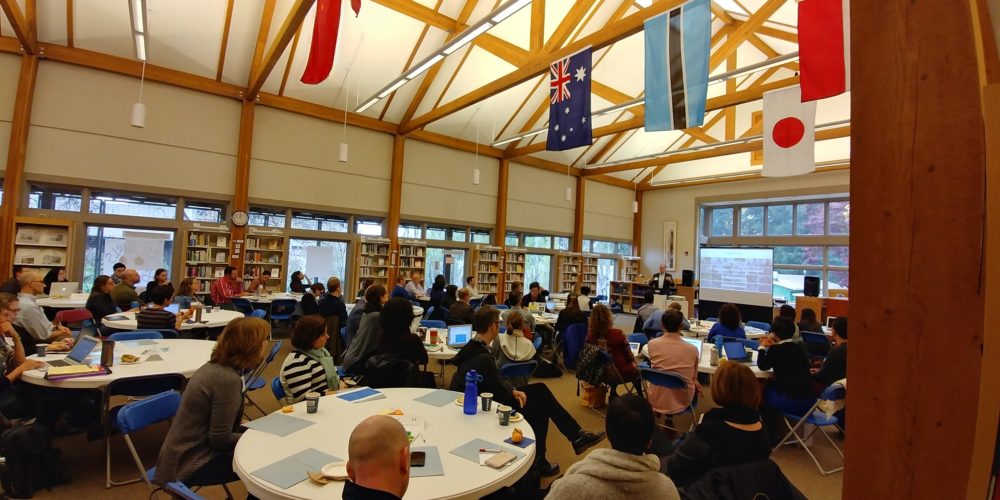Paradigm Shift: GOA's Partnership with the Mastery Transcript Consortium

GOA designed four regional events for the MTC, including at Catlin Gabel School in Portland, OR.
How do you galvanize a community to join a movement to change education?
In 2017, GOA began a professional learning partnership with the Mastery Transcript Consortium (MTC) to support what will be a systemic change in education: transforming the high school transcript. The MTC’s mission is to re-invent how students prepare for college, career, and life by creating a high school transcript that reflects the unique skills, strengths, and interests of each learner. Instead of the traditional mode of using seat time and grades as the main components of a transcript, the MTC has proposed a Mastery Transcript: a digital platform that articulates essential skills, habits, and dispositions that are linked to student work as evidence of learning.
The implications are paradigm-shifting. Adopting a Mastery Transcript will affect all levels of school, from classroom culture to the college admissions process, from how we use time and space to how we talk to students and families about performance.
The goal of GOA and MTC’s multi-year partnership is to design professional learning experiences where teachers and leaders from MTC member schools use the proposed structure of the Mastery Transcript as a way to think critically about how we talk about, assess, and report learning. Much of the success of the movement depends on the ability of teachers and school leaders to shift practice and drive change in their classrooms and their communities. The critical shift is for MTC member schools to adopt a student-centered, skills-based approach to teaching and learning that will enable them to make full use of the Mastery Transcript.
As a fellow global consortium of schools that has itself begun the transition to competency-based learning, GOA is both a kindred organization and an enthusiastic member of the MTC. The MTC’s work and the challenge ahead for its members resonate deeply with us. (Click here to learn more about partnering with GOA for professional learning.)
“GOA has been a valuable thought partner since the first MTC organizational meeting convened by founder Scott Looney,” said Patricia Russell, the MTC’s Chief Education and Operations Officer.
This partnership presented GOA with an exciting, provocative challenge: How might we design learning experiences that prepare a global network of educators to become part of a movement?
Four Steps GOA and the MTC Took to Lead Professional Growth
1. Identify and Engage Change Leaders
Each MTC member school has appointed a Site Director, a member school leader charged with driving the adoption of a Mastery Transcript at school. GOA and the MTC designed a series of two-day, in-person workshops that offered these key change leaders the chance to learn more about the MTC, practice working with the structure of the Mastery Transcript, and participate in a series of design challenges on change management and communication. The focus on collaborative and generative work is not just good pedagogy; it allowed Site Directors to form relationships with colleagues from other schools.
2. Leverage Online Learning for Depth and Breadth
In addition to engaging Site Directors, the MTC has invited all teachers and leaders from member schools to investigate mastery learning and its potential impact on classroom practice and school culture. GOA has designed and facilitates a trilogy of online courses — the Mastery Learning Series — open to all educators from MTC member schools. The scaffolded nature of the courses — beginning with a holistic introduction in the first course and concluding with a project-based leadership course in the third — allows educators to engage to the depth they want, providing the most enthusiastic participants with increasing support and feedback from facilitators. The flexibility and accessibility of these online courses has allowed close to 500 additional educators to engage in the mastery learning conversation, with another run of the series set for 2018-2019.
Weaving in-person and online learning into an ongoing, coherent program addresses one of the major challenges of effective professional learning: ensuring that teachers have the opportunity to learn and practice over time and in a way that meets their individual needs and contexts.

The Mastery Learning Series has asynchronous and synchronous components, including a video review of student work to calibrate assessment practices.
3. Model Mastery Learning
Eliminating grades and seat time as criteria for reporting learning allows for more individualized approaches that meet students where they are and focus on growth, not comparison or competition. Through intentional experience design, GOA aims to model mastery-based approaches, not only by weaving in-person and online learning into a cohesive experience but also using articulation of personal goals and questions to drive learning, using participant-led presentations of learning to school heads as summative assessments, and designing multiple pathways towards learning targets. Modeling these principles of mastery learning is critical to deepening participants’ understanding of what they might look like in their own practice.
“GOA is skillfully role-modeling how to design mastery learning opportunities,” Patricia said. “Each program is built around MTC teacher-leaders interests and suggestions, and colleagues from member schools find guidance and mentorship as they set both aspirational goals and concrete, individualized steps forward for each unique school.”
4. Focus on the Network to Elevate Educator Voices
The MTC is a global network, and its members bring a wide variety of experiences with mastery learning to the organization. To ensure that members are benefiting from the insights and progress of their colleagues, GOA designed many of the activities online and in-person to focus on sharing stories and strategies, on finding new connections outside of our immediate contexts, and on attaching human faces and voices to the work of schools. Mastery learning is an evolving field and practice, so a networked approach to collecting and sharing knowledge is the best way to complement the existing research.
The second year of GOA’s partnership with the MTC will build on the success of the first year: creating another series of in-person events for Site Directors and other school leaders and continuing to design learning experiences that meet the needs of a diverse, global community. “We are honored that GOA continues to facilitate the much-praised MTC Mastery Learning Series and our regional Site Director Meetings,” Patricia said.
How is your school or learning organization addressing the conversation around mastery learning? Tell us on Twitter and subscribe to our newsletter to stay updated on all of GOA’s work.



